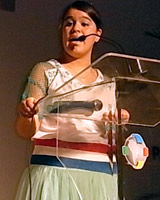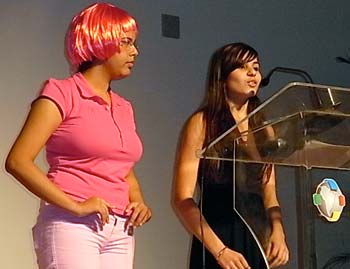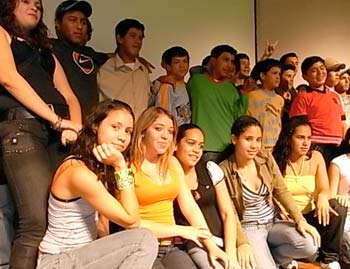Fostering culture of non-violence through ICT
23-06-2009 (Montevideo)

Young participant introducing
a folk dance.
© UNESCO
110 young people from Brasilia and Paraguay, together with 40 volunteering mentors, participated in a half-year pilot project initiated by the Brazilian Institute of Applied Technology and Innovation (ITAI) and the UNESCO Offices in Montevideo and São Paolo. The project aimed to foster a culture of non-violence among young people by using strategies of capacity-building for social and professional integration.
On 23 May 2009 the closing event of the pilot project Young People for Non-Violence took place in the border region of three Latin American countries: Foz de Iguazú (Brazil), Ciudad del Este (Paraguay) and Puerto Iguazú (Argentina).
The immense success of this social and educational initiative was showcased by 70 Brazilians and 40 Paraguayans. To demonstrate their work, young people presented a book, videos containing interviews with teenagers and other community members, photos, and modern and folkloric dances. They celebrated a culture of non-violence in the three-border region, which holds one of the highest tolls of violence and drug abuse among teenagers in Latin America.
UNESCO presented its contribution to support peace, reconciliation and a culture of non-violence in Latin America and other regions. Juan Meré, from the NGO Iniciativa Latinoamericana, shared his experience outlining the methodology of the project Clubes, which addressed young people in three departments of Uruguay between 2006 and 2008.
In the sixth-month period, from November 2008 to April 2009, the participants of the Young People for Non-Violence project gained valuable knowledge in areas relevant to their social and professional integration through regular weekend workshops on sociology, history, ecology, information and communication technologies (ICT), and multimedia and media literacy. The participants were selected according to their families' income scale.
The use of ICT proved to be a key motivator of the initiative, with ITAI’s support for community telecentres and community radios. Young people learned to document interviews, to write and layout reports and to produce audio and video clips.
Günther Cyranek, from UNESCO’s Office in Montevideo, highlighted teenagers’ creativity: “The project clearly showed how information technology can be used as a creative, educational and catalytic tool for young people. We are very proud of the outcomes of this initiative. Teamwork, enthusiasm and professional use of ICT helped mobilise creativity of the participants to promote non-violence”.
Both participants and mentors showed high interest, commitment and strong desire to extend the project. The initiative will, therefore, go ahead fostering a culture of non-violence and helping reduce digital divide in favour of social inclusion.
The immense success of this social and educational initiative was showcased by 70 Brazilians and 40 Paraguayans. To demonstrate their work, young people presented a book, videos containing interviews with teenagers and other community members, photos, and modern and folkloric dances. They celebrated a culture of non-violence in the three-border region, which holds one of the highest tolls of violence and drug abuse among teenagers in Latin America.
UNESCO presented its contribution to support peace, reconciliation and a culture of non-violence in Latin America and other regions. Juan Meré, from the NGO Iniciativa Latinoamericana, shared his experience outlining the methodology of the project Clubes, which addressed young people in three departments of Uruguay between 2006 and 2008.
In the sixth-month period, from November 2008 to April 2009, the participants of the Young People for Non-Violence project gained valuable knowledge in areas relevant to their social and professional integration through regular weekend workshops on sociology, history, ecology, information and communication technologies (ICT), and multimedia and media literacy. The participants were selected according to their families' income scale.
The use of ICT proved to be a key motivator of the initiative, with ITAI’s support for community telecentres and community radios. Young people learned to document interviews, to write and layout reports and to produce audio and video clips.
Günther Cyranek, from UNESCO’s Office in Montevideo, highlighted teenagers’ creativity: “The project clearly showed how information technology can be used as a creative, educational and catalytic tool for young people. We are very proud of the outcomes of this initiative. Teamwork, enthusiasm and professional use of ICT helped mobilise creativity of the participants to promote non-violence”.
Both participants and mentors showed high interest, commitment and strong desire to extend the project. The initiative will, therefore, go ahead fostering a culture of non-violence and helping reduce digital divide in favour of social inclusion.
 Young participants presenting their work.
Young participants presenting their work.© UNESCO
 Young participants of the project.
Young participants of the project.© UNESCO
Related themes/countries
· Argentina
· Brazil
· Paraguay
· Youth and ICT
Share this story:
Contact information
-
Contact
- Günther Cyranek, UNESCO Office in Montevideo
- Vanessa Dias, UNESCO Office in São Paolo
- Jaime Nascimento, ITAI
- UNESCO Office in Montevideo
Field office














